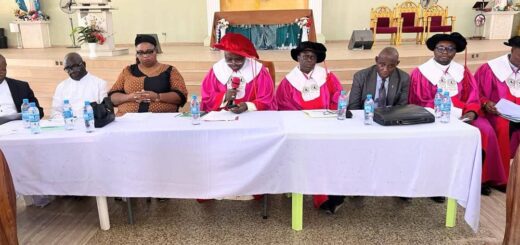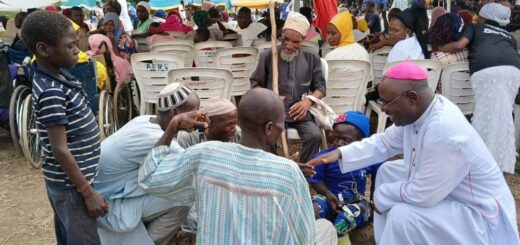Hostility against Jesus from His home town
by ARCH BISHOP · July 4, 2021
Fourteenth Sunday, Year B. Homily by Archbishop I. A. Kaigama at the Immaculate Heart of Mary Parish, Dabi, Abuja, July 4, 2021.
Readings: Ez. 2:2-5; Ps. 122(123): 1-4; 2 Cor. 12:7-10; Mk. 6:1-6
It is a great pleasure to visit you at the Immaculate Heart of Mary Parish, Dabi. May our Blessed Mother obtain graces and favours from her Son, Jesus Christ, in answer to the prayers of your parish priest, Rev Fr. John Obi, the 108 candidates for confirmation and indeed, all the parishioners, that you may bear more spiritual and pastoral fruits.
The ministry of Jesus extended to Gentile territories, where He was well appreciated. Last Sunday, the woman with the issue of blood demonstrated faith in Jesus by saying, “if I only touch his garment, I will be healed” (Mk. 5:28). Similarly, it was in a pagan territory that the Roman Centurion told Jesus, “Lord, I am not worthy that you should enter under my roof, but only say the word, and my servant shall be healed” (Mt. 8:8).
In today’s Gospel reading, Jesus came back to His own people and was not received properly. He was disdained and perceived as a revolutionary who was changing the customs and everything they knew. They were astonished by His wisdom, recognizing Him as the ‘son of Mary’ and the young carpenter whom they had seen growing up; not gone to any formal school, yet preaching better than the scribes and working miracles. Indeed, as John 1:10-11 says, Jesus came to those who were His own but they did not receive Him.
The people of Jesus home, Nazareth, either lacked faith in Jesus or rejected Him in error, since they had already their set of ideas about the coming Messiah, and Jesus did not fit into it. They could also have rejected Jesus as a result of jealousy, resisting the idea that a mere “carpenter” would come back to them, teaching with authority and performing wondrous deeds.
We see a similar rejection in the first reading of Ezekiel the prophet who was commissioned by God to speak to the rebellious and obstinate house of Israel. While in exile in Babylon they nostalgically sang: “By the rivers of Babylon… there we sat down and wept when we remembered Zion” (Ps. 137:1). While the false prophets were consoling the people with the promise of a soon-to-end exile, Ezekiel announced the further destruction of Jerusalem, thus arousing the hatred and rejection by the people.
Those who heed the call of God to preach, have to deal with hostility, contempt, rejection, persecution and opposition as did Jeremiah who was thrown into a pit and left there to die (cf. Jer. 38:1-13), and also Isaiah who cried that he dwelt in the midst of a people of unclean lips (cf. Is. 6:5).
Those called must speak with prophetic courage and truth even in the face of indifference, unaddressed injustice, corruption and social decay. Ezekiel 2:5 says, “Whether they hear or refuse to hear, they shall know that there has been a prophet among them”.
St. Paul in our second reading reveals how he was “content with weaknesses, insults, hardships, persecutions, and constraints, for the sake of Christ” but the grace of God, was sufficient for him.
Nazareth was perhaps a place for the desperately poor and even violent people as we read in Luke 4:29 where they attempted to kill Jesus. Jesus left Nazareth as a carpenter; He left as the son of a lowly woman called Mary; a common Nazarene who was very much like other inhabitants of the town facing the same socio-economic challenges. But after initiating a successful pastoral ministry, He returned to Nazareth no longer as a mere citizen of the town, but as the Messiah with power and authority, to repair broken relationship and to lead them back to God.
Jesus faced hostility at home and so refused to work miracles there. Our youths likewise feel unappreciated at home, and so, their faith in the country is shaken and they prefer to flee to other prosperous countries in search of greener pastures. Countries abroad become the beneficiaries of some of our best fleeing intellectuals, experts and skilled personnel. Little wonder, the US, UK, Canadian and other embassies in Nigeria are often crowded by young people seeking visas to “check out”.
My plea to those who have no other choice than to leave our fatherland is to come back after finding knowledge, treasure and socio-economic balance. Do not forget your roots, culture and language or allow the frustrations you experienced at home to make you hate your fatherland/motherland.
May God grant you success, and when you succeed, look back on your beloved country with magnanimity, and seek to promote her interests. The government must on its part pay particular attention to the genuine agitations and clamour of Nigerians for social justice, inclusive governance, improved security, adequate social services, increased youth empowerment and seek ways of meeting the legitimate needs of the masses.
Nigeria must celebrate her own, failure of which forces our young people to escape elsewhere due to what an ancient philosopher Protagoras, would describe as “might is right,” namely, where the rich, influential and powerful are always right, and even those who fleece our common patrimony are bestowed with prestigious traditional, religious, academic or national honours.
Our Church must try not to neglect any segment: the children, the teenagers, the youth, the women groups, the Mass servers, etc. and not misunderstand, scorn, despise, reject or undermine anyone’s gifts and contributions.
It is my earnest prayer and desire that God will renew in the hearts of all of us a prophetic zeal, and grant us the grace that is sufficient for us even as we face insecurity, economic hardships and personal crises.




